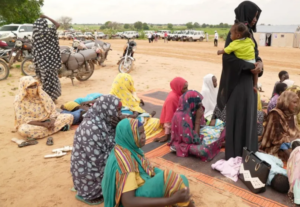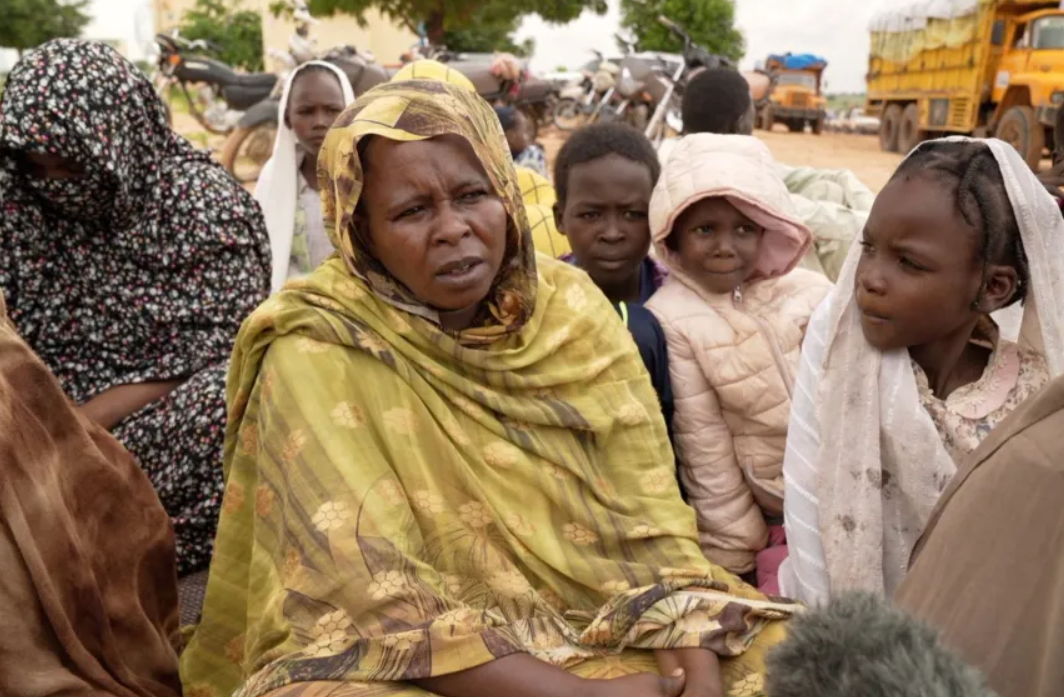The Critical Circumstances at Adré
A tragic event takes place amidst the barren grounds of Adré, a vital border crossing between Sudan and Chad. Mother Buthaina, 38 years old, and her six children sit on the ground among other women who are also in a similar situation. All of them seem to be homeless, with expressions of hopelessness and weariness written all over their faces. A severe scarcity of food and water forced Buthaina and her family to flee from the besieged Darfuri city of el-Fasher, which was more than 480 kilometers (300 miles) distant.
The devastating effects of the civil conflict that broke out in Sudan in April of last year are brought home by Buthaina’s moving account of their flight. Much destruction has resulted from the war between the Sudanese Armed Forces (SAF) and their old paramilitary friends, the Rapid Support Forces (RSF). The fight for the future of the country, which includes initiatives for civilian rule, has reached a critical point, causing a humanitarian catastrophe.
A Humanitarian Disaster on the Rise
Thousands have died, millions have been displaced, and huge areas have fallen into hunger as a result of the continuing fighting. The humanitarian situation in Sudan is dire, with aid organizations expressing grave concern that the country may soon experience the greatest famine on a global scale in the absence of further assistance.
A Price Paid by Humans
There have been many obstacles to the international community’s reaction. The terrible conditions were clearly visible during recent visits to Adré and Port Sudan, which is 1,600 kilometers away on the eastern coast and is one of the key relief distribution hubs. The humanitarian tragedy that the conflict has caused has taken Adré’s life as a symbol. Since January, when the border crossing was closed, virtually little aid could reach the people who needed it. There is still worry that the relief that is coming may be inadequate and delayed, even though it has just reopened.

Countless Sudanese refugees traverse Chad every day, with numerous mothers bringing their undernourished children along. They quickly make their way to water tanks that have been set up by the World Food Programme (WFP), one of many United Nations agencies that is doing its utmost to bring attention to the magnitude of the situation. Refugees have built improvised camps out of plastic, wood, and linen, but they aren’t very well protected from the weather. The arrival of rain makes matters worse by making the environment more conducive to disease and making relief delivery even more complicated because of floods.
Due to the lack of reliable information coming out of the war-torn region, the Struggle for Aid has proclaimed famine at the Zamzam camp in Darfur. The World Food Program’s reported delivery of more than 200,000 metric tons of food from April 2023 to July 2024 is much lower than what is needed. The SAF has been blamed for obstructing help to regions controlled by the RSF, which includes most of Darfur, while other militias have been accused of stealing and damaging supplies.
Bureaucratic red tape has become an additional roadblock to relief efforts. While waiting for clearance from the SAF, relief convoys can sit in Port Sudan for weeks. The situation is still unstable, but there is hope thanks to recent accords that will allow relief shipments via Adré.
Repercussions for Uprooted Communities
Refugees in camps like the one in Port Sudan describe terrifying events. The battle has taken a terrible toll on civilians, as survivors of abuse, rape, and torture in RSF jails have described. One mother recounted the horrific events of being violently separated from her son, who had also suffered from terrible maltreatment. As a result of RSF threats against males trying to flee, Safaa, a mother of six who also escaped Omdurman, is distraught about what happened to her husband.
As far as the UNICEF camp workers were concerned, the refugees were the “lucky ones” since they had escaped the imminent threat and were able to find safety and assistance. These victims’ physical and mental wounds, however, serve to underscore the larger catastrophe.
A Worldwide Reaction and What Lies Ahead
The necessity for refocused global attention was stressed by UN Deputy Secretary-General Amina Mohamed during her visits to Sudan. Conflicts in Gaza and Ukraine have taken center stage, putting the Sudan problem in the background. It is clear that more international support is needed to stop the bloodshed in Sudan, and Mohamed is doing his best to keep the country in the spotlight.
There must be an immediate and strong humanitarian response to the crisis in Sudan. The future looks gloomy for the millions of people impacted by this conflict unless there is a surge in international action and aid.



















